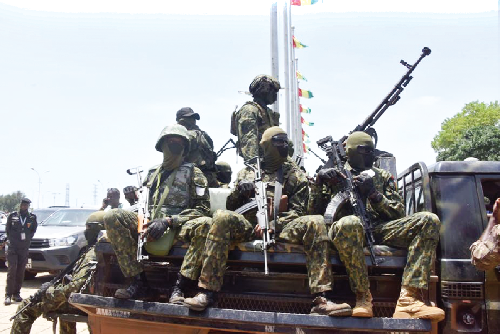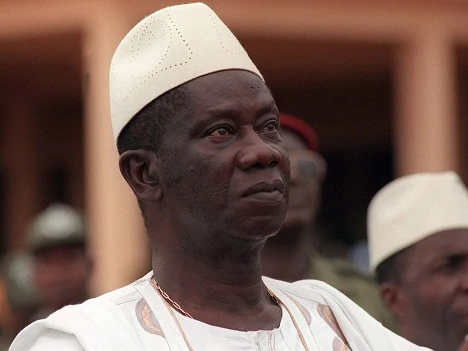
Of term limits and coup d’etats - Et tu Guinea?
During the year 2020, four African Presidents from Côte d’Ivoire, Guinea, Niger and Burundi completed or were about to complete their final terms in office, according to the constitutions of their respective countries.
However, only two of them, namely Pierre Nkurunziza of Burundi and Mahamadou Issoufou of Niger agreed to step down while Alpha Condé in Guinea and Alassane Ouattara in Côte d’Ivoire went ahead to run for a third term in office by changing their constitutions.
Advertisement
These developments of presidents tampering with the constitution to bypass term limits are not only harmful for democracy but are the source of coups and instability being witnessed in the sub-region.
Military coup d’etats in West Africa have been a regular occurrence in Africa in the decades since independence and the recent events in Guinea resulting in the ousting of President Condé are the latest example of the army interfering in national politics.
Neighbouring Mali had had two interventions by the army in less than a year, the most recent one occurring in May. In Niger, a coup was thwarted in March just days before a presidential inauguration.
When is a coup a coup?
One definition used is that of an illegal and overt attempt by the military or other civilian officials to unseat sitting leaders. A study by two US researchers, Jonathan Powell and Clayton Thyne, has identified over 200 such attempts in Africa since the late 1950s. About half of these have been successful - defined as lasting more than seven days with Burkina Faso having had the most successful ones, with seven and only one failure.
Guinea’s coup
Last Sunday, mutinous soldiers in Guinea staged a coup d’etat and detained the 83-year-old President Alpha Conde after hours of heavy gunfire near the presidential palace in the capital, Conakry.
The soldiers, named National Committee for Rally and Development, led by Colonel Mamadi Doumbouya, seized control of the airwaves and announced on state television that the government had been dissolved and its constitution declared invalid while professing their commitment to democratic values. “We will no longer entrust politics to one man. We will entrust it to the people,” said Doumbouya.

In 1984, Lansana Conte took control of the country after the first post-independence leader died
Military takeovers
Guinea has a long history of political instability and military takeovers and with the recent event, the country now faces serious political uncertainty. This latest development was a dramatic setback for the country, where many had expected Guinea to turn the page on military power grabs.
In 1984, Lansana Conte took control of the country after the first post-independence leader died. He remained in power for a quarter of a century until his death in 2008, accused of siphoning state coffers to enrich his family and friends.
Second coup
The country’s second coup soon followed, putting Army Captain Moussa “Dadis” Camara in charge. During his rule, security forces opened fire on demonstrators at a stadium in Conakry, where they were protesting his plans to run for president.
Human rights groups have said more than 150 people were killed and at least 100 women were raped. Camara later went into exile after surviving an assassination attempt, and a transitional government organised the landmark 2010 election which was won by Alpha Conde who became the first democratically elected leader in Guinea since its independence from France.
Constitution amended
He later last year amended the constitution to allow him to stay in power beyond the two-term limit and won a third term in a disputed election and that move sparked widespread protests with his opponents accusing him of veering towards authoritarian rule.
Conde’s 2010 election victory, the country’s first democratic vote ever, was supposed to be a fresh start for a country that had been marred by decades of corrupt, authoritarian rule and political turmoil.
In the years since he took over the reigns of government, opponents said Conde too failed to improve the lives of Guineans, most of whom live in poverty despite the country’s vast mineral riches of bauxite and gold.
The year after his first election, he narrowly survived an assassination attempt after gunmen surrounded his home overnight and pounded his bedroom with rockets. Rocket-propelled grenades landed inside the compound and one of his bodyguards was killed.
Violent street demonstrations broke out last year after Conde organised a referendum to modify the constitution. The unrest intensified after he won the October election, and the opposition said dozens were killed during the crisis.
Col Mamady Doumbouya
The coup leader, Col Mamady Doumbouya, aged 41, is seen as the new man in charge of Guinea after he successfully led a unit of elite soldiers to seize power a couple of weeks ago.
Little is known about Col. Doumbouya's early life, except that he is from the Malinké community like President Condé and hails from Guinea's eastern Kankan region.
Notably, Col. Doumbouya is among 25 Guinean officials the EU has been threatening to sanction for alleged human rights abuses committed in recent years under President Conde.
Col. Doumbouya also quoted the late Jerry Rawlings of Ghana - who seized power in 1979 - saying "if the people are crushed by their elites, it is up to the army to give the people their freedom".
His military career
His 15-year military career has seen him serve in missions in Afghanistan, Ivory Coast, Djibouti, Central African Republic and close protection in Israel, Cyprus, the UK and Guinea.
He is said to have "brilliantly completed" the operational protection specialist training at the International Security Academy in Israel, as well as elite military training in Senegal, Gabon, and France.After serving in the French foreign legion for several years, Col. Doumbouya was asked by President Condé himself to return to Guinea to lead the newly established elite Special Forces Group (GFS) in 2018.
In recalling Col. Doumbouya to set up the GFS, President Condé did not have any idea that he was hastening his own political demise.




